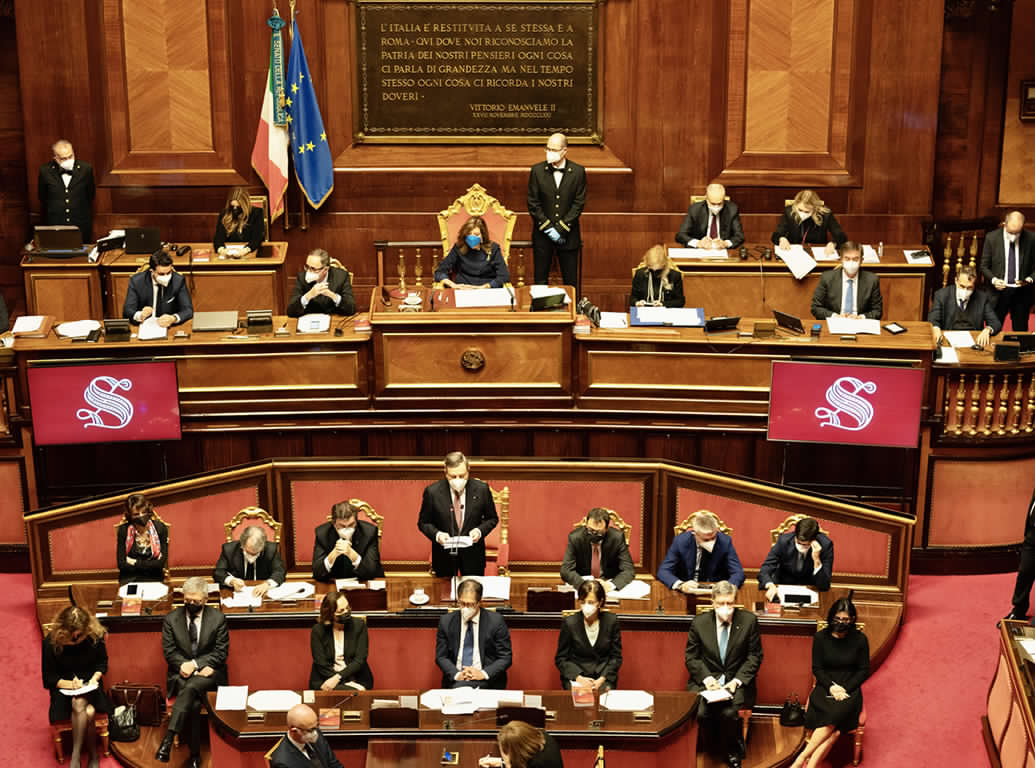Projects and visions, here are the news of Draghi’s speech

What's new in the speech in Parliament of the Prime Minister, Mario Draghi. Enrico Martial's article
The novelty of Mario Draghi's speech , yesterday in the Senate, lay in its normality and therefore in its easy understanding. He traced a perimeter and a path – Europe, Atlanticism, representative democracy, recovery – then he designed both the specific policies, on the environment, digital, social, gender, development balances, and the reforms, including the fiscal one, showing the complexity and the need for intervention. Everyone understood it, he did not hide the words, he was able to unite the armed forces, civil protection and voluntary work, and with this describing an idea of the nation, which he recalled elsewhere through the concept of citizenship and citizen. He crudely quantified how far we are behind the role of women, in wages, in attendance in senior positions: substance, therefore, and not just respect for form, of the "pharisaic" legislative application of the pink quotas. He quoted Pope Francis on the environment, combining the homage and the gesture of respect with positioning on new policies, which are then European and therefore Italian. He described the numerical targets to be achieved for zero emissions by 2040. He spoke of interest groups, generations, companies to be exploited and others to accompany. Everyone got it.
It was a political discourse, of the "very fine politician" described by Bruno Tabacci, in which experience is accompanied by interdisciplinary studies and readings, not only of economics, but also of history, literature, and specifics, including the science of politics . Compared to the good national politician (and they are already few), who draws on his university and technical training – lawyers, architects – who gained experience alone, in ministerial secretariats, in electoral campaigns, in local authorities or in parties , we are here on another plane. We can glimpse the knowledge and the fresco of national events – hence Cavour's quotation on reforms, very symbolic – a reference to evidence based decision making, passages in the debate on contemporary moral thought.
In his speech at the Catholic University of October 11, 2019 he identified three characteristics useful for good decisions: knowledge, courage and humility. The world is complex, knowledge is necessary but it is objectively limited by the availability of information, the time available, the ability to interpret it to understand the possible consequences and find the measures to adapt to uncertainties. Therefore, you can be wrong, decisions often involve "courage", and not deciding is always deciding something.
Draghi then added the reference to humility, and in English it would sound better "integrity", of proximate meaning. Because of these "humility" and "integrity", calls were heard in the Senate for the ability to listen, but also for unity, which becomes a "duty" and cannot be a simple option. At Bocconi in 2019 he explained that the mandate received within the ECB had to be fulfilled "in full", assuming full "responsibility": another word that has often returned to the Senate. The union of knowledge, courage and humility made it possible to calmly introduce the idea of a tax reform on the national agenda, without many expecting it. It has been posed in a serious and clear way, as a comprehensive reform that is done only occasionally – necessary decades later – far beyond the flat tax style propaganda.
With this political depth, with these readings and vision behind them, lightning could pass in a low voice, on the waste in the vaccination pavilions, mobilizing instead the resources already available to do it quickly and well, or on the approximation of European investments for the technical institutes still lacking a reform. The references are France and Germany, we must bring ourselves to their level, remembering that others have a higher consideration for us than we have for ourselves.
With Draghi, the public agenda then acquires another meaning, it is not a mechanical list, a summation expressed by juxtaposed interests – as has been the case for years. It becomes national, or "republican", and the latter word has reappeared after years of oblivion. The projects become coherent with each other: we will soon read that our school-work alternation is to be improved, that we must create new technical colleges, that the number of recharges for electric vehicles must reach the French and German levels, as well as progress in hydrogen. We need to improve in the territorial structure as a basis for tourism (we have no ecological corridors, for example), in the environmental and digital professions.
They are all very modern themes, but drawn on a political structure and style that does not seem entirely new. Rather, it makes us think of the stage of a journey, of a continuity that reassures in a very tormented homeland history, with few decisive protagonists in critical moments, one of which was Cavour himself, whom Draghi rightly mentioned first.
This is a machine translation from Italian language of a post published on Start Magazine at the URL https://www.startmag.it/mondo/progetti-e-visioni-ecco-le-novita-del-discorso-di-draghi/ on Thu, 18 Feb 2021 08:43:06 +0000.
